This is not a standard dance music story. Marquis Hawkes is one of the club music success stories of the past couple of years – since the first release in 2012 on Glasgow's revered Dixon Avenue Basement Jams, there've been many 12" club hits on multiple connoisseurs' labels, and his album Social Housing on the Fabric club's Houndstooth label has soundtracked many people's summer this year, with the artist all the while remaining anonymous. But the reason for that anonymity is that he's a long, long way from the usual neatly-coiffed 20-something house producer you usually see in “breakthrough artists” lists.
In fact, Marquis Hawkes is a hilariously obvious pseudonym for Mark Hawkins, grizzled old former producer of uncompromising experimental techno in the late 1990s and early 2000s. And the tale of how he came to music production is one of the more unusual ones. It's set not just in the traditional techno centres of London and Berlin, but in the mountains of Wales. It takes in Tonto's Expanding Head Band, watching the M25 being built, grooving to the Green Cross Code, living on the back of a truck, fishing joyriders' cars out of quarries, and residencies at East German “crystal meth raves”. It also includes deep involvement with the free festival soundsystem culture that is a hugely important but under-reported part of the UK dance underground. And in Hawkins's upbringing and life story is a microcosm of the evolution of British underground and pop music over several decades. Get yourself a cup of tea and strap in for the ride.
JOE MUGGS: First up, can we ask why you decided to go incognito as Marquis Hawkes. Was it because you were typecast as a techno guy?
MARK HAWKINS: Beyond being typecast as a techno guy, it was being typecast as a sub-sub-sub-sub strain of techno guy. I was always on the fringe of the fringe, I never fit in with what was being played, and as a result by 2012 I'd basically given up. I made the odd tune, but it was what I did in my spare time. The idea of having any kind of music career was definitely down, down, down. Never going to happen.
But then Dan and Kenny [Lurinsky and Grieve, veterans of Glasgow's club scene and founders of the Dixon Avenue Basement Jams label] approached me, like, “We’re doing a new label, a bit more house-y, if you’ve got any tracks send them over.” They knew I always did a bit of Chicago house stuff back in the day, using the DJ MH name. So I sent some, they heard “Sealion Woman”, Kenny said “woah, we're having that!” so I made a few more to go with it, thinking nothing of it, just doing it for the fun of it.
Then it was, “Jesus, what name am I going to... I can’t release these as Mark Hawkins, this isn’t going to work. I mean I could, but it’s just going to get ignored.” Because I had this kind of feeling [that] the distributors and the record stores and the people that make sure the music gets into the store – the first gatekeepers of getting your music out there – would be like, “Okay, we know what that guy’s like and we’re not interested in what he does, so we’ll pass on that” kind of thing. Maybe that fear in my own head was inflated more than was the actual reality, but Dan was like, “Leave it with us, we’ll come up with a name.”
They came back with the name Marquis Hawkes and I was like [tuts] “OK, whatever you say, okay, I don’t care anymore,” just thinking, “Oh yeah, we’ll sell 300 records, we’ll cover our cost, all cool.” But then he started doing the pre-sales and they’re getting orders in for 800, 900, everyone was going, “Yeah I’ll have a piece of that,” and it was a bit, “Woah, I'm onto something here.” So I guess if it wasn’t for them I wouldn’t be sat here now, I wouldn’t be talking to you, I wouldn’t be doing what I’m doing. So I owe a lot to Dan and Kenny, definitely.
The Glasgow thing’s really interesting because they've never had a sense of generation gaps in their dance music, and also no snobbery, but amazing quality control: it was always, “Is it banging techno, is it amazing house?”
They’re the least prejudiced people I’ve ever met in my life. Absolutely awesome. But it’s also worth bearing in mind that they have a massive connection with Detroit, and there’s so many Detroit records that come into Europe through Rubadub [Glasgow distribution company and record store]. I would say pretty much 75% of the music coming in from Detroit passes through Glasgow on the way into Europe. There’s always been this connection: it's roots, it's solid roots there.
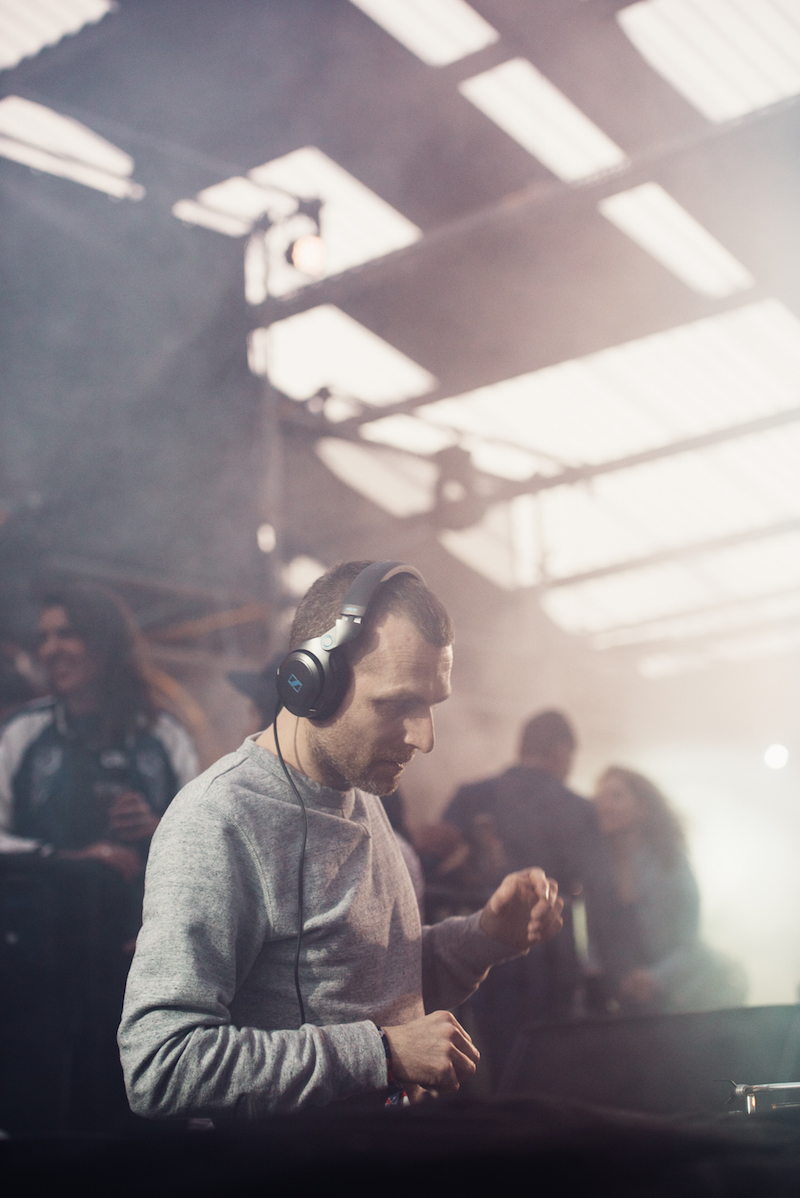 I think Derrick May said Club 69 [in Paisley on Glasgow's outskirts] was the best club in the world, Carl Craig said that, in attitude, Glasgow was the blackest city he knew outside Detroit [laughs].
I think Derrick May said Club 69 [in Paisley on Glasgow's outskirts] was the best club in the world, Carl Craig said that, in attitude, Glasgow was the blackest city he knew outside Detroit [laughs].
I love playing in Scotland, and I've got a Scottish agent so I get to play loads of the smaller cities which are easily as appreciative of underground music as, say, Glasgow is. But I hate it also, because if you go anywhere else you're spoiled – outside of, like, Northern Ireland or maybe Republic of Ireland, North of England a bit, maybe Russia sometimes when you hit the right place – I had some crazy Russian escapades in the last few years, that’s another story entirely… But they’ve got something where you play in Scotland, and then you go somewhere else and you’re looking at the crowd bobbing around like, “What’s wrong? Why aren't they going wild? These records worked amazingly in Inverness last night.”
Now... can we get into a bit more detail about how you got to this point? What were your musical roots?
I grew up on the edge of London, around Upminster. I was born in Barking, but we lived on the edge of suburbia – it was like the green belt. I remember the M25 being built, literally. And my dad’s got a massive record collection. They were real heads, my folks. They'd seen Cream before Cream were big in some pub in Dagenham. They’d seen Pink Floyd before they were big. So it was a musical house. They weren't trained musicians, never really in bands or anything like that, but my dad always played guitar. He’s on about his sixth instrument now, I saw him yesterday and he’s getting into violin now [laughs]. He’s been into bass for a few years, he tends to shift every few years onto another thing because I think his musical taste will shift, or he finds that he runs out of people to play with.
He was always going to blues parties, too. He used to work at the telephone exchange in Stepney, he worked with all these Jamaican guys, and they’d be like, “We’re having a party, come down.” So he’s got like a massive box of Greensleeves 7”s and stuff, so I was brought up with a real mix of Captain Beefheart – that was my dad’s favourite and still stands up to this day as totally uncompromising – with Bowie, with Pink Floyd and blues-influenced rock music, but also the reggae thing. But also, you know this album, White Noise?
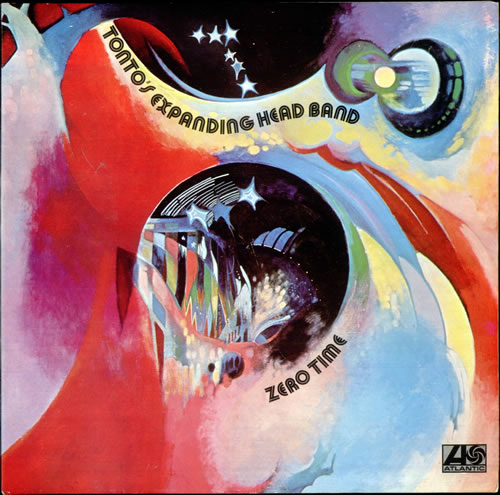 Delia Derbyshire, right?
Delia Derbyshire, right?
Yeah, he had a copy of that, Tonto’s Expanding Head Band [synth experimentalists most famed for working with Stevie Wonder] and things like that. But the thing that really caught my attention that he had was [Ultravox founder and electro pioneer] John Foxx. That was one of the first things that really caught my ear. Another funny story was Dad heard “Planet Rock” on John Peel, I think he’d been out with friends or something like that, and was a little bit – shall we say? – mentally expanded, at the time and thought, “What an amazing record,” went out and bought it, and then in the week listened back to it and was like, “What did I buy that for?” No word of a lie, that was actually one of the first records in my record collection – as a kind of hand-me-down.
Going further forward into school, one musical memory that really stands out is... Do you remember the old Green Cross Code advert that was a flip on Grandmaster Flash – “Don’t step out!”. The first time I heard that, I saw the Green Cross Code advert and I was like, “Woah, that’s great.” Then, when I was about 11 – just going into secondary school – where I lived, even though it was at the time very, very suburban, we had a lot of kids from Rainham, getting onto the edges of East London and Romford and whatever, coming to our school. And among them there were a few kids into this breakdance scene that was kind of emerging. The film Breakin’ was coming out and everything. And because of John Foxx, “Planet Rock” and that, I connected with it. That’s very much still a part of the culture we live in, that’s the roots of black British music or urban British music. This is probably '86, '87...
That’s when LL Cool J and Run DMC were everything. Def Jam ruled.
Yeah, there was a Public Enemy track around the same time, probably ‘87 or ’88 that John Peel kept playing. It was one of the first times I’d heard abstract sampled sounds: I didn’t know what they were doing, I didn’t know how they made it sound like that, but it was just this repetitive sound, with rapping over the top, and I was blown away. And it was the first thing that was, like, mine in a way.
But I’d always had this curiosity with starting a band or trying to make music somehow, and most of all I wanted to make electro. I just wish my mum had bought me an 808 [drum machine at the heart of electro, hip hop and techno]. I reckon my parents could’ve found an 808 at a junk store for literally £50 at that point. I tell you, if I’d have been given an 808 when I was ten, 11 years old I would’ve been off completely. But I didn’t find out about those things until many years later.
So the next thing after that, was we moved up to Suffolk in ’88 – not really a hotbed of music, even though John Peel lived not that far from where we moved. I was listening to the radio all the time, and I remember Jeff Young and his Big Beat – I used to listen to that and It was a great mix of kind of real hip hop-influenced stuff and house kind of mixed together in hip-house.
But I think ground zero, for me, and it was a totally cheesy track at the time, and it definitely probably wasn’t one for the heads, but [huge chart hit] D-Mob “We Call It Acieeed”. Anyone cool was probably pooh-poohing it like it was the cheesiest thing ever, but it was just that whole “I know a song that’ll get on your nerves” for parents kind of thing [laughs]. But I heard that and that’s the first thing that gave me one of those real moments which I've had a fair few of since: it was a real milestone.
Shortly afterwards on the radio in a mix, probably on the Jeff Young show, I heard Armando – it’s a favourite track of mine – “Downfall”, which actually took me 20 more years to find out what the hell it was. At some points I thought I had imagined it, I'd imagined that there was this acid track that had that acid line. I actually started to think that it didn’t really exist and that I’d just dreamt it or something. But to this day that is my favourite acid track of all time, and in 20 years’ time it’ll be my favourite acid track. Everyone goes on about “Acid Tracks” [by Phuture, the first acid house record], but Downfall is sleazier, dirtier, uglier, just more rude, just… It was punk to me – that kind of music was really punky.
A funny thing happened then, though. The rave thing was taking off – and because I was in a rural location, there were a few raves going on locally, there was people driving down to Luton to go to Exodus raves, this is now when I’m 13, 14, 15. But the thing was, you started really getting the bandwagon-jumpers then. It was getting a bit trendy. The thing that got me was all the dicks at school – the real nasty people at school, if you were a bit different or a bit weird, you don’t quite fit in, the people you don’t get on with – all started getting into it and it just turned me off: “I really want nothing to do with this.”
I shunned the whole thing and got really into kind of indie stuff and punk stuff instead, and I guess from electronic music I had a kind of four- or five-year hiatus where I was just like, "I don’t want nothing to do with this because I don’t want to hang out with these nasty people that are horrible to me at school. I’d rather hang out with the goths. Even though I’m not totally goth, I can get a bit of what they’re into and we’re just doing our thing smoking dope and drinking cider on the park."
But then I got to 16, and then along comes [notorious hardcore traveller rave soundsystem] Spiral Tribe and Castlemorton (pictured below) and the festival madness when it starts being in the news. I’m just coming up to school-leaving age and it’s been in the news, there’s all these crazy people that look wild, driving around like Mad Max or something in these old buses and trucks, and they’re dragging sound systems around… At the same time my dad was into Gong, he was never so much into Hawkwind, but he was into Gong. And I was meeting other people, maybe from the goth side a little bit, who were a bit into Hawkwind maybe. So that had attracted my attention towards the travelling scene too.
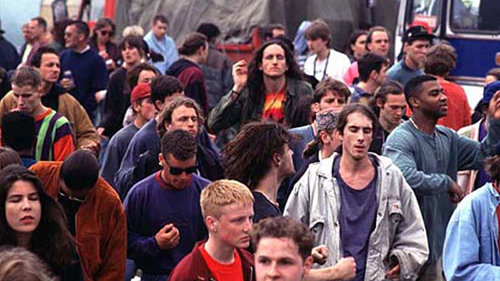 If you lived in the countryside back then that scene was never very far away.
If you lived in the countryside back then that scene was never very far away.
Especially if you want to go score some dope or something, it’s kind of, “Where do we go? We go to the traveller site.” Or you have that weekend ritual, every Saturday you go to town to check out the record store, buy some music, and there’s always, like, a war memorial where there’s people hanging out with cans of Special Brew, or people sit in a park in a certain place, and it was that kind of social scene.
The goths and the crusties and the punks and whatever were never quite that far removed from each other in small towns – there’s only so many of them in any given town, so they have to hang out.
Yeah, and then there was the amazing colliding of two cultures once you had Spiral Tribe show up. Basically I totally flunked school, I didn’t get on with school at all, and I didn’t get along with a lot of people at school. I had my friends but I had my not-friends as well. So I basically left school at 16 after having seen Castlemorton on TV the day before my exams: totally didn’t bother going to my exams and went to, like, free festivals in the Midlands and stuff instead. I was seeing the swan song of the UK free festival scene really, because in retrospect of course it was the end of it. But it was amazing. Hang out in the right pub, with the local types, and someone'll say “so and so festival is happening, you want to come, right let's go!”.
Within a year I’ve left school, tried to go to college, flunked it out, lived in a squat for a few months, and the next year I was like, “Next year I’m doing it proper, next year I’m doing every festival I can." Little did I know that it was going to get stamped on so hard. It was the summer of ’93 and it was getting heavy police stuff. But I was like, “No, I’m going to do it, I want to experience this thing.” So by the end of the year I owned a truck [laughs].
I had a flatbed truck with a bender [a tent made from willow or birch poles and lorry tarpaulin] on the back and I was living on the road, basically. The funny thing was, I actually went to a festival near Bury St Edmunds where I was growing up, and there were people from school – the idiots from school [laughs] – there, and then they see me, with dreadlocks, nose rings, all the crusty people there, and they’re like, “Oh… Right… You’re with the guys running the party now...” [laughs] So it’s funny, the tables have turned, you know? And that was the next five years of my life.
The first thing was going to parties, but quite quickly I was looking for more than just getting fucked up every weekend. And a big milestone for me was I went to a party by a sound system called Virus – who were kind of some ex-Spiral members – and they had this guy Patrick playing... who later on I became good friends with, and still am. I heard this music and it was a lot of Cologne acid, Robert Armani, things like this, a kind of proto-version of what we would all get into later on, just that weird, messed-up vibe where it sounds like a machine but a weird, funky machine, kind of music.
I came away from that party – it was on a grassed-over landfill site in Evesham, hardly glorious to look at – totally keyed up. The next weekend I went to some trance party in beautiful surroundings, in North Wales where I was living at the time, and I just remember being there, and I looked around and it’s like, “Yeah, it’s a beautiful view and everything, but this trance music… It’s not like that party last weekend, man,” and for me it became very clear it was really about the music. So that was the catalyst really that started me DJing, because I kept going to these parties – and we had parties where we lived, so I'd go to whichever soundsystem turned up “if you’re going to come here and do your party, you’re going to give me an hour in the morning and I can play my weird records [laughs].”
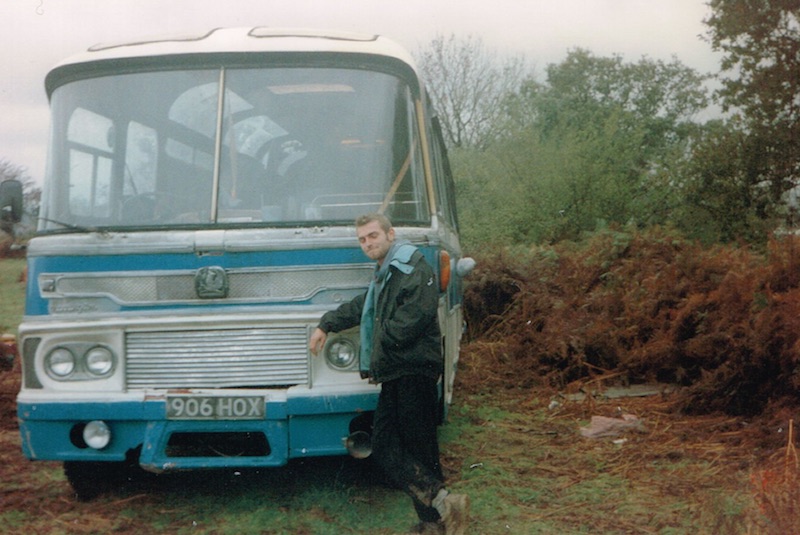 Did you still want to make your own music?
Did you still want to make your own music?
Well within about a year, I'd gone from a truck to a bus (pictured left), and I’d gone from having a bag of records to a box of records, and had a bit of a selection, everything from house to gabber [ruthless 180bpm-plus Dutch hardcore techno]. I started to get a little bit more ambitious with it and started to think, “Maybe I want to do something with it, this is actually the first thing in my life that I can do that I really like, that maybe I could make a bit of money out of or carve a bit of a niche out for myself.” But I was sat down with this guy, this guy that we used to collect scrap metal with – we used to drive round in his truck, he had this big Ford D-series with the crane arm on the back. We’d go round, we’d find all the cars that the joyriders had dumped and burned out – we’d go there with a winch, pull them out of quarries. We could stack three up and you’d get £50 a car at the time
Joyriding was quite the thing then, wasn’t it?
Yeah, and I suppose we were profiting out of it. So we’d go and collect up cars or collect up anything – dumped caravans that nobody wanted, all that – we’d collect the scrap and get the money for it.
Anyway, I sat down just drinking a coffee with him one day, and he goes, “You know what? You don’t want to be just playing the music, you want to be making the music,” and I thought, “You’re right, that’s a really, really, really good point actually.” I didn’t have any decks at this stage, though. I actually learned to DJ in someone’s record shop – this record shop in Carmarthen in Wales where I bought some of my first records. I was just like, “Will you let me just play around on the decks?’, and they went, “Yeah, if you don’t fuck the records up, yeah, fine, go for it.”
I literally learned to beat match in a week. Then the following weekend we had a party and it was a party where I could blag a play – Tipi Valley, actually. My first ever DJ set was at Tipi Valley at some trance party. We lived on this traveller site on the other side of the valley from Tipi Valley. We had an OK relationship with these people, but they were like, “You’re the kind of Brew Crew crusty types, you’re not the hippie good guys,” because it was real hippies vs Brew Crew thing at the time. “You’re the reprobates, we’re the respectable face of this thing because we rent our land” or whatever. They used to get people show up in vans or whatever wanting to park up there, and they’d go, “Nah, you go over there, you go over the other side of the valley, that’s more your people over there!” [laughs] Funnily enough this was the same site where Sian from Kosheen [makers of huge 2000 drum'n'bass chart hit “Hide U”] was living, we had some great parties together!
Anyway, I went to this party going “Give us a go, give us a go.” So I did my first DJ performance within a week of learning how to beat match. I played Phuture “Acid Tracks” at 45 RPM [laughs]. I didn't have many of the kind of hardcore Cologne acid records I wanted, Dr Walker and Jammin’ Unit and that, but sped up, “Acid Tracks” was a bit like that. Of course, back then it was really difficult to find exactly the music you’re looking for. You imagine living near Carmarthen. There was a little record shop, you’d get the occasional Tresor record show up there, I remember when Inhabit The Machines by Neil Landstrumm came in there and I passed on it the first time because it wasn’t a Cologne acid record – and I was so gutted in retrospect. Years later I was kicking myself, going, “Why didn’t I buy that record?” because often you only got one chance.
Now, this leads us onto another big milestone. Because this gets to 1996, and in the autumn – at that time every beginning of autumn you had the Harvest Fayre in West Wales, out towards Fishguard – that particular year we had a whole bunch of travellers who would’ve normally parked in the Midlands, around Leicester way, came down and stopped on our site on the way and were like, “You coming to the Harvest Fayre?”
You just hear the sound of their engines coming up the valley and see the lights in the darkWe all kind of knew each other because everybody in that scene knows everybody – everybody’s parked up with somebody before somewhere – and there was a few people I’d come across before who were cool, old friends and whatnot. They were like, “Oh yeah, we’ll come down for Harvest Fayre,” and of course, before mobile phones, before the internet – literally the only people that had mobile phones were the big drug dealers [laughs] and that was it – you didn’t know these people were going to show up, you just hear the sound of their engines coming up the valley and see the lights in the dark. It’s like, “What’s going on?”, and this convoy of vehicles show up, “Who’s that?” “Oh I recognise that bus.” “Oh that’s Nick, that’s so and so, they’re coming down,” you know? And they’re like, "We’re going to Harvest Fayre, we thought we’d pop by for a couple of weeks, break up the journey!”
So we went to this Harvest Fayre, obviously didn’t buy a ticket – as the traveller way was back then, it was just show up, park your vehicles in the gate until they relent and let you in [laughs] – busted our way into this festival, and that is when I met Grant from Ugly Funk who I would work with a lot. So yeah, end of ’96. I’d been playing with these other people and nobody had the same taste in music as me. Everyone gave me my space to do what I wanted, but I never had a real kinship musically with anyone until I met Grant and his lot, and I was like, “Woah, this is amazing, some people who like this stuff.” They weren’t so much into the house music I was playing, but they were into the kind of techno music I was playing.
So they had a sound system?
Yeah, they had the BWPT sound system, which they’d been running round the Midlands for a few years, before Grant went on to do Ugly Funk. He’d been doing club nights in Leicester, he used to book Cristian Vogel, Neil Landstrumm, Surgeon, The Advent, the full range of UK techno… That was a very important meeting for me because Grant was always like, “I want to start a label,” and I’m like, “I want to make music,” so that was kind of an important meeting in a lot of ways. Shortly afterwards I met Esther Ofei on a visit to House Of God in Birmingham who's another important person in my life from this period and who's even done some vocals for me recently. Then just as I got into doing this stuff, from '97 onwards, like I said at the start, the scene felt like it was splitting in front of our eyes. The mainstream [of techno music] became this very repetitive, very loop-based stuff, and the funkier stuff that we loved got side-lined in a lot of ways, and we couldn’t really achieve the goals we were dreaming to achieve. We just weren’t in fashion.
And when did you actually start producing?
Well, actually I’d originally moved to Wales because I heard there was a guy living on the site who had an Amiga and tracker software or something, but it turns out he didn’t actually have it there, it was stashed at some – by the time I got there he’d actually stashed it at some house in Gloucestershire or something, and that never really came about. Then what happened was, basically, I thought “Nothing’s happening here, it’s very nice living in Wales and everything, living on top of the mountain, but it’s not what I want.” So ultimately I dumped my bus, and I moved up to the Midlands, hooked up with those guys I'd met at the festival… But, as you probably know in these kind of scenes, it’s all in disarray – people are out of their head doing crazy things, it’s all a bit crazy.
 I ended up moving to Nottingham because we'd done a party with Desert Storm soundsystem from Glasgow, the ones who ended up dong a convoy to Bosnia – anyway they do techno music, but they'd talked about Smokescreen around this time, also DiY (pictured right), as playing really good house music, and they were from Nottingham. So I reconnected with house a bit through Smokescreen and DiY, I'd already got really into [Chicago producer] Green Velvet, Relief Records and stuff. But the BWPT lot were very militant, very hard-line: techno or nothing!
I ended up moving to Nottingham because we'd done a party with Desert Storm soundsystem from Glasgow, the ones who ended up dong a convoy to Bosnia – anyway they do techno music, but they'd talked about Smokescreen around this time, also DiY (pictured right), as playing really good house music, and they were from Nottingham. So I reconnected with house a bit through Smokescreen and DiY, I'd already got really into [Chicago producer] Green Velvet, Relief Records and stuff. But the BWPT lot were very militant, very hard-line: techno or nothing!
I think Grant always wanted it to be like the British Underground Resistance or something like that “We only play techno, bla bla bla,” this kind of thing. I think I got a bit kind of sucked into that, didn’t want to be made fun of for dropping a piano house tune – seriously you’d get a bottle thrown at you. You play a house tune on their system, you’d get bottled off, it was brutal. I have to add, actually, I’ve known those guys over the years and they are actually some of the warmest guys you could ever meet. But at the time when everyone’s full of vodka and amphetamines, everything gets a bit kind of heated or whatever [laughs], especially when they’re really adamant that it has to be the right kind of techno – no dull, loop techno, and certainly no house.
So what then...? Ah, that was it, I did a studio engineering course, that was my first access to any equipment. The funny thing was that they were trying to teach people to record vocals, record guitars, I was like, “Just give me a drum machine and a mixing desk and some effects, that’s all I need. I just want to make raw Chicago tracks, that’s all I need.” And they let me have a little play.
You can’t do this fire circus shit in the middle of the city, you’re going to hurt the touristsI didn’t really settle in Nottingham; I was still bouncing around different places around the whole country. I went back down to Somerset – I had some friends with a soundsystem there, I wanted to go and hang out, be more involved, because I’d gone to Nottingham but I was kind of the outsider – I hadn’t lived there a long time, I didn’t know many people, the groups were formulated. I could get a play here and there… That’s when I first started playing in clubs – I was given a warm-up slot in a club that this sound system Samovar did, and they played really kind of acid techno and that kind of thing. Because I had the warm up, I had a lot of free reign, so I could play, like, Underground Resistance, electro stuff at the beginning, just play a variety of stuff.
So that was kind of good on the DJ side, but the first time I was really let loose in the studio – I ended up living in Portsmouth after an ill-fated mission to Italy on £5 following a New Year party. Went to some Spiral Tribe and Total Resistance New Year party, and I met this guy from Total Resistance – they’re the guys that drove to India with a sound system to be in Goa for New Year’s, you can look on YouTube and find these guys! And I met one of the main guys behind that and he was like, “Come to Italy, we’ve got a studio, yeah, we’re looking for people who make music, bla bla bla.”
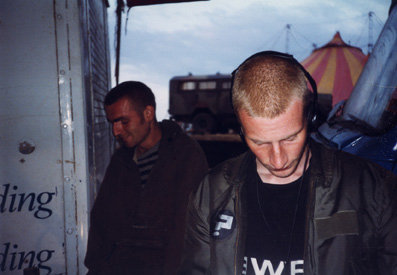 And of course you get all the way out there and it’s closed shop – obviously because they have their own thing and if you don’t exactly fit in with that... Which is fair enough in its own way – but I think sometimes people might tell me things and I would be naïve enough to believe everything’s going to happen when it might be just people trying to get you to come to their party at the end of the day. But it’s great story to say I went to Italy on a fiver and ended up busking with a fire diabolo in the streets of Milan and being almost arrested by Italian police saying, “You can’t do this fire circus shit in the middle of the city, you’re going to hurt the tourists,” I suppose.
And of course you get all the way out there and it’s closed shop – obviously because they have their own thing and if you don’t exactly fit in with that... Which is fair enough in its own way – but I think sometimes people might tell me things and I would be naïve enough to believe everything’s going to happen when it might be just people trying to get you to come to their party at the end of the day. But it’s great story to say I went to Italy on a fiver and ended up busking with a fire diabolo in the streets of Milan and being almost arrested by Italian police saying, “You can’t do this fire circus shit in the middle of the city, you’re going to hurt the tourists,” I suppose.
When I got back I ended up in Portsmouth, and I met this guy – and what happened became a continuing theme of meeting people who had music equipment, but they had jobs and they were always like, “My studio’s not quite finished, I need to go to work to buy this next bit of kit so then my studio’s finished, so then we’ll start making music.” OK no, he wasn't entirely like that, but he made his music but he had a job, and I was just like, ‘”When you’re at work can I come round and use your gear?”, and he was like, “Yeah, sure, come round,” and that was when I first made stuff. Literally up until the tenth record I made, I never had my own equipment. I think I had a one-year period with an MPC2000 [sampler] where I never actually made anything that ever got released. It was like my success such as it was was entirely based on blagging other people to let me use their gear [laughs].
So you had to learn the ropes each time and develop new skills?
Yeah, because equipment’s different. The studio engineering course was quite useful because it had taught me how to use an Akai sampler, which was the standard, and I could kind of work out other samplers from that.
And did you settle down anywhere?
Nah – that was the funny thing, when I played my first ever overseas paid gig at Neue Heimat [in Stuttgart], Daniel Benavente said to me, “Marc Snow from [foundational Berlin club/label] Tresor told us that you’re, like, some homeless guy or something.” [laughs] I’m like, “Well, yeah, kind of...” I was a sofa-surfer, really. Let's face it, really up until probably I was 27 or 28, I was a mess. I was this kind of person that just couldn’t look after themselves, and just didn’t know how to look after themselves at all. I still feel like I’m still learning, but I’m just about getting there now, I’ve finally made it to adulthood, you know? [Laughs] The only thing I was really, really on it with was this mission to make music, and that was the only thing I could focus on, really. Sod there being rain on my roof or rain on my head or anything like that
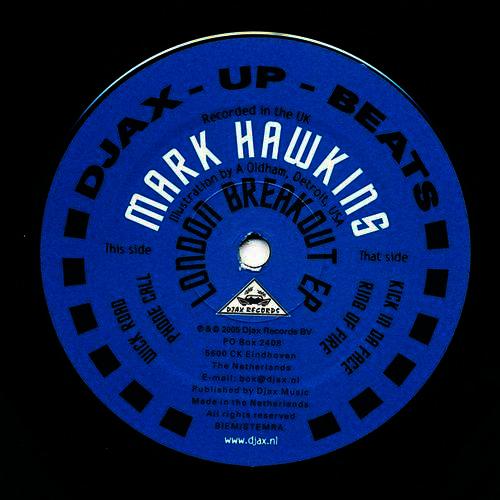 But people were picking up on your music?
But people were picking up on your music?
I did a little stint in London pretty much living underneath [techno record shop] Dragon Discs – either sleeping in the cellar, or Grant had a room above it – I worked the odd shift, and that’s when I first met Jerome, and me and Grant set up a studio together. I actually made the first demos for DJAX-Up Beats there, and Rocket who used to be in Gaye Bykers on Acid, who owned Dragon Discs, he was the guy, he literally called Saskia and said, “I’ve got a producer here who wants to send you a demo, what’s the address?” and just goes, “Right, yep, put your demo in the envelope, off you go,” and just set the wheels in motion.
So that’s another Midlands connection is it, because Gaye Bykers were from Leicester?
I guess so, because Grant knew the Bykers, and Tony from Gaye Bykers on Acid lived on site with us in the Midlands also. Robber was living there also, there was like half of Gaye Bykers on Acid were living with us as well – of course they were a big festival band.
Gaye Bykers made really interesting techno crossover stuff as well.
Even the more rocky music they made was crackers... that was another thing, I’d been listening to them when I was about 15, so that was crazy to meet them and be living with old kind of heroes was funny. They’re interesting because they got signed to a major and pretty much spent all of their advance on doing this film that actually ended up looking like a really bad, no-budget, D-movie or something – it’s really funny, that’s something else you can see on YouTube. Robber told me years later that they got this big advance – it wasn’t that big in the scale of things, but it was like £20,000 or £30,000, a nice sum of money at the time – they blew the lot on doing this film [laughs], it was absolutely ridiculous.
But yes – that was the kind of beginning, really, of making music for me. The roundabout story that it is [laughs].
DJAX was a pretty prestigious label then, did you start getting decent gigs?
It took a year after the first record came out. These things take a lot of time. About a year after I released the first record on DJAX and I’d just been doing a lot of releases – doing too many releases, really, and putting out too much stuff almost out of desperation, because it was like, “I’ve got to make my mark, I've got to get out there and do this thing.”
I got my first gig at Neue Heimat, and then I had a few things in Scotland through Test, which is where I first met Dan [Lurinsky], I'd run into him a lot over the years, and I did a techno release for his Monox label. It was epic for me because I was meeting all these people, meeting Justin Berkovi, Dave Tarrida, meeting those kind of people, and I was just like, “Woah.” I’m 24, 25 years old, maybe 26, and I’m just like, “Ohhhhh my god, I’m meeting my heroes,” quite in awe of the whole thing.
But like I say, it never really ignited into... I never got to the point where I could really live from it, even the basic existence. It was a lot of scrabbling about for bits and bobs, I think, probably the main reason being our music just wasn’t fashionable at all – it was like the most unfashionable, dark corner of techno and experimental music. That was the point – it was the experimental music, people just did not want experimental music.
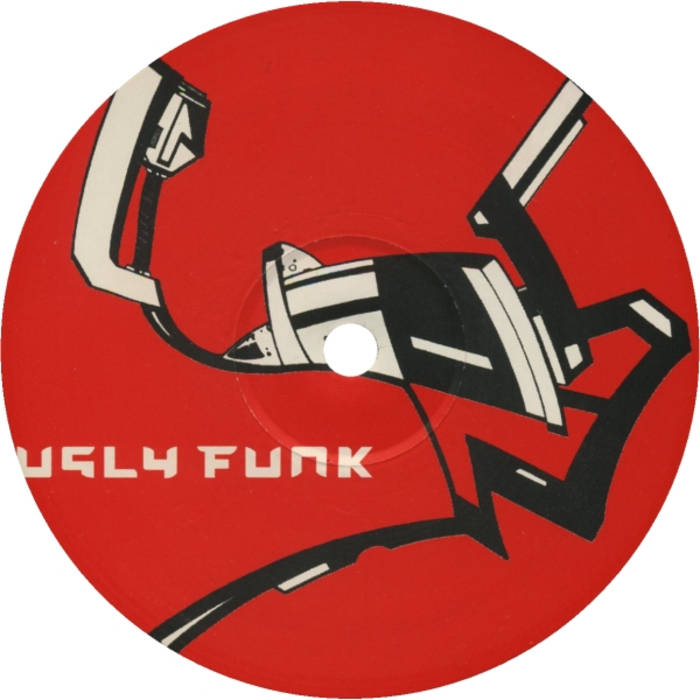 Except in the occasional corner of Poland or Sweden or wherever, right?
Except in the occasional corner of Poland or Sweden or wherever, right?
The old East Germany was the big one that ended up becoming like a coffin for me in the end. These crazy crystal meth raves where they just wanted super-hard techno – nobody knows about this outside of Saxony and Thuringia and these kinds of areas but within that it was a massive scene. But that was ever decreasing circles too, and I had to extract myself from that. Also I had this paranoia that I was stuck in 1995 where my inspiration had begun, and probably trying to emulate people like Cristian [Vogel] and Neil [Landstrumm] far too much. Other people hear my own sound in my music from that time more than I hear it myself, because a lot of the time these days I'm just massively conscious about the pastiche elements. But obviously when you try and regurgitate something it’s never going to come out sounding the same, you know?
So then into the 2000s it just got fewer and further between? I remember you sending me music in the mid-2000s, but it was just the odd track, and you were mainly driving a van.
Yup. I’d moved to Berlin then out of Berlin. London burned me out, Berlin burned me out: I could never settle anywhere. I was always moving, searching for happiness in the next place – “Maybe it’ll be better in the next place” – and then I’d just be in the same shit at the end of the day. What I realised in the end was, “I’m just trying to run away from myself, I need to sort myself out before everything goes to pot – it's not the place, it's me.” I’d moved from Nottingham down to Dorset, split up with my girlfriend at the time and moved up to London, and then ended up having a kid with her after the split – which was all very messy as you'd imagine. Tried starting a label at that time, but after a year of that it was “This ain’t happening, trying to live in London on this meagre existence, and I’m earning all my money in Germany, mainly.” I just ended up thinking, “I need to move where the money is,” and moved to Berlin for the first time in 2004.
But even after the move there, minimal techno was the big thing, that was really coming in there, the old, high-energy Berlin techno thing had died a death, and there was even less role for me than before. Again, I was late to the party. I feel like my whole life I’ve been late to the party. Until now, where it’s like what I’m doing now is just so old that it’s come back again [laughs]. I know now that that was what I was waiting to happen the whole time, really: never expecting it but it was the only way it was ever going to work.
I lived in Germany for two years, met a Polish girl, moved to Poland for a year, ended up living in Gdansk for a year. I really wanted to write an album, but of course there’s no takers for what I was doing: you haven’t got relevance on the scene so no one’s really going to want to push an album if you’re not relevant to what’s going on at the time. I really felt like I couldn’t really get with dubstep, I couldn’t really get with minimal – maybe some things here and there in the minimal thing, the more kind of Deadbeat and the Spectral stuff, Ghostly and that kind of thing, I could get with that because it didn’t seem quite so corny or something. But the big, corny, cheap-sounding minimal… I just really – and it seemed like so many people were jumping onto it and were probably responsible for that – I just didn’t want to be one of those people.
The funny thing was, I’m in Poland and there’s loads of people around us going, “Let’s go to England and get a job so we can have money,” including my girlfriend. She was like, “You go first because you’re from there, and then you can get the place to live and get the job, then I’ll come over.” So I move over, move to my parents’ place, get a job, and then she goes, “I don’t want to move there” [laughs], I’m left high and dry.
But it was like the best thing that could ever happen to me in a way, because I then got into this mind-set of, “Okay, I’m just going to get a proper job. I’m just going to give this a go for once.” I was driving vans and doing that, and I met my wife, as she is now. She was in Lithuania, I was in the UK, we were both bored at home and talking online, but we had mutual friends in Lithuania, where I'd played a few times – and we’ve been married eight years now, so that’s had a happy ending and everything.
She moved over to be with me and live with me in the UK for a couple of years. I was still doing music, but I just came to this point where the scene in London just wasn’t doing it for me, and we didn’t have so many friends, and what friends we did have just took so long to go and see them... You know how it is, if you’ve been out at work and you’re doing a normal job, by the time you get home, the last thing you want to do is trek halfway across London to go and visit some friends – two hours each way.
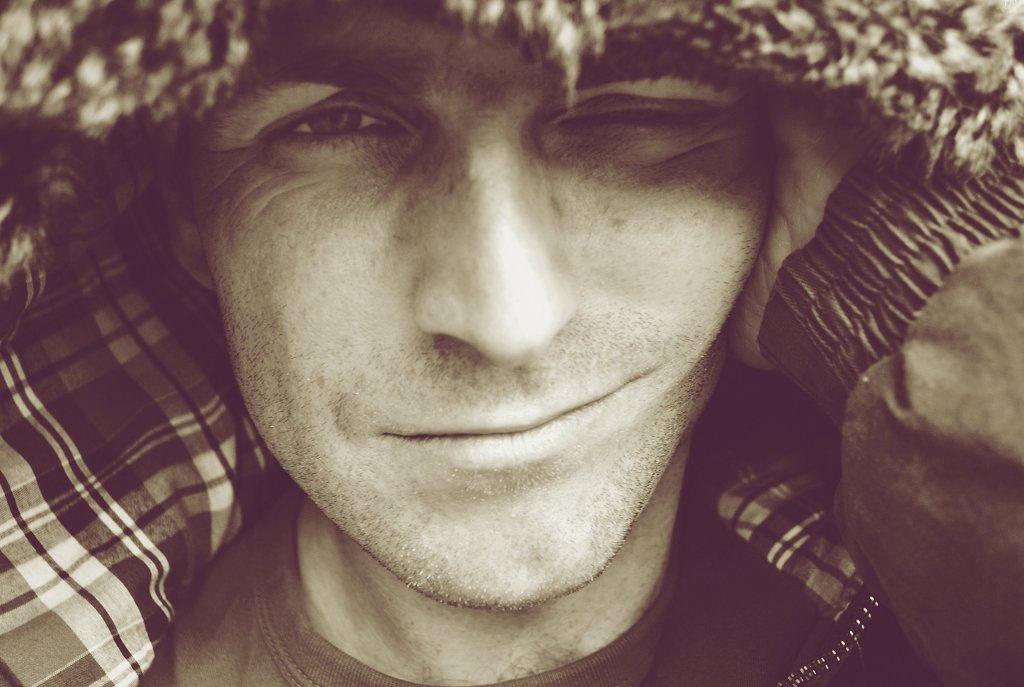 I’d always wanted to move back to Berlin, but because I had a child in the UK I was kind of like, “That’s off the cards, I can’t just desert my child in the UK,” but then when I was married to my wife by this point, she said “I can’t stick this country anymore, I can’t stick this place anymore, I don’t really like it, what were you saying about Berlin?” And in the end I relented. But at the end of it all, I actually see my eldest daughter now more than I ever did then – because she comes to visit me every summer and stays with me for six weeks every summer for the whole summer holidays. So I have more quality time with my eldest now than I did when I lived in the UK.
I’d always wanted to move back to Berlin, but because I had a child in the UK I was kind of like, “That’s off the cards, I can’t just desert my child in the UK,” but then when I was married to my wife by this point, she said “I can’t stick this country anymore, I can’t stick this place anymore, I don’t really like it, what were you saying about Berlin?” And in the end I relented. But at the end of it all, I actually see my eldest daughter now more than I ever did then – because she comes to visit me every summer and stays with me for six weeks every summer for the whole summer holidays. So I have more quality time with my eldest now than I did when I lived in the UK.
We went there with just the thought of, “We’ve got a lot more friends there, it’s easier to get about, there’s more music we’re into, more food we’re into, things going on we’re into, vibe we’re into, and it’s cheaper,” and I just figured I’d rather have a crap job in Berlin and be able to afford to go out and have time to see people, than have a crap job in London somewhere where we’re never going to be able to afford to buy anywhere or anything like that. So that was like the prime motivation to kind of go there, really.
A lot of people say, “I thought it was the stage in my career to move to Berlin and take it to the next level” because it's known as such a techno place, and it just totally was not like that. It was just as I mentioned, plus the fact that I could already speak German well enough to get a flat, open a bank account, deal with the day-to-day business on my own. I still do take a lot of pride in that fact.
Just from playing a lot in Germany?
Yeah. And that really paid dividends when I was there. I was trying to get a van-driving job in Germany. I tried out for DHL in Berlin and there was a guy – the manager dude at the warehouse – he saw my name and was like, “Mark, hey, down on your luck a bit, are you? I used to play at Tresor from time to time, I’ve got your records” [laughs]. I was just like, “Oh my god.” But my god, their workrate: they’re delivering double the amount of parcels than in the UK, but they’re all like ice hockey players on speed, these guys, or something. They must’ve been seriously on some stimulants to do the work, because it was just unbelievable – I couldn’t keep up with these guys.
But then finally I got a job at a club, where I worked for two years doing the sound, and then my German got really good because pretty much nobody spoke English there. I ended up not only being the sound engineer, I ended up being driver, translator, artist liaison, like, anyone from the UK or the US. I’d be driving [Detroit techno originator] Eddie Flashin’ Fowlkes around for the weekend – and he'd say “Oh, can we just pick up Tyree?,” so I got to know [Chicago House pioneer] Tyree Cooper as well through that – he’s a really, really nice guy. It was an education; it was a big education on seeing how that field works on a different level as well.
And you'd given up producing entirely?
Well, all but. It was nothing more than a hobby. DJing likewise. And this is where the mail from Dan and Kenny came in and it all kicked off!
And Marquis Hawkes took off from there?
Yes, and pretty quickly too. Lots of different labels and then eventually Houndstooth signed me for three albums. And for the first time in my life, I'm making an actual living as a DJ.
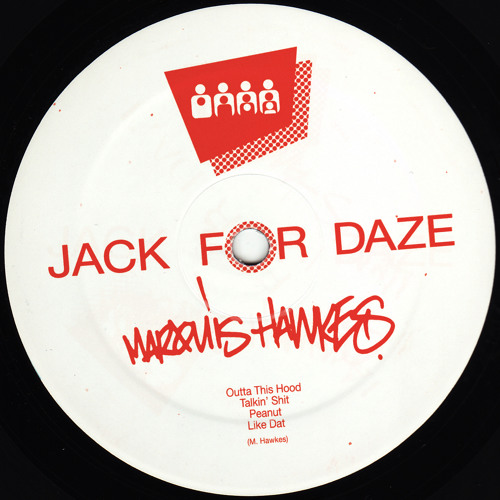 There was some controversy early on because you were seen as appropriating working class Chicago music – in particular because you named the first EP after a particularly ghetto Chicago neighbourhood.
There was some controversy early on because you were seen as appropriating working class Chicago music – in particular because you named the first EP after a particularly ghetto Chicago neighbourhood.
Yeah... and maybe it was a bit ignorant to pull a name out of a hat like I did to signify something like that, but I’m pretty much at peace with myself about the whole thing. Certainly I've got no interest in the people who tried to shout me down on social media about it. That kind of “Who can shout loudest?” behaviour feels to me like the reason the US has Trump in the position he is, in fact. The people that should’ve been trying to convince that their way of thinking was wrong and showing them another way, and saying, “Hey, I think you’re wrong, and I think you’re wrong for [these] reasons,” instead, “You’re wrong, you’re bad, you’re an asshole.” What’re you going to do with those people?
I think a lot of these people that do the shouting down, not because they’ve got the right reasons at heart, they’re doing it because they want to score more brownie points and say, “Look at how right-on I am,” you know? I sat down with [Detroit techno producer] Anthony “Shake” Shakir around then, and he said to me, “Man, they just want to be you.” I don't know if that’s really true or not, but there's probably an element of taking a pop at success. I mean, nobody complained when I made that sound but wasn't selling anything... because it wouldn't have got them social media brownie points.
What a lot of those people didn’t realise, when [the defining Chicago ghetto house label] Dance Mania wasn’t fashionable and wasn’t big hype, people like me, Esther Ofei, the Ugly Funk guys, we were playing that music, we kept that sound alive in the UK because pretty much nobody else was. We were showing people that music and saying, “This is cool music” back when it wasn’t a cool thing. People were like, “What’re you playing that shit for?”, you know? But we were playing it because we loved it. It was totally paying tribute more than anything. To try and make out that it’s some kind of racist thing… [shakes head] And the silliest thing was, someone said “Marquis is an African-American name” – it’s like, “Well no, not necessarily: that's pretty much [racial] stereotyping you're doing there!” Most of these people shouting the odds were white middle-class kids anyway. So yeah, maybe I made a cultural faux-pas with a track title, but I don't apologise for making this music, and I don't want to be lectured about it by that lot!
I honestly think it’s the greatest time ever for underground dance music right nowTalking the real-world connections and real-world life, what does the club scene feel like to you now? I guess you never detached from it because you were working…
Well, I had times when I detached from it, and I should also say that I came late to clubs: I went to so many free parties and raves before I ever went to a club. But now I would say it’s more exciting than ever – it’s the most exciting time, and particularly in the UK. To be quite honest, I’m gobsmacked at how it is. I play, I would say, 65-70% of my gigs in the UK now, ironically enough given that I moved to Germany and then I get most of my work here, but it’s because Britain has always been a bit of a house-centric place, much more so than Germany or just about anywhere else in Europe: it's all techno in Europe now, bar maybe France and the Netherlands.
I honestly think it’s the greatest time ever for underground dance music right now. I’m going to towns that just didn’t have a scene, really, years ago, and playing some of the same records – I used to play them pitched up, now I’m playing them pitched down – and I can go out on a limb, go super varied. Whether it's Leeds, Nottingham, Newcastle, whatever, people are super open-minded. In the late Nineties when I was first playing people would just be like, “If you’re too schizophrenic as an artist and we can't pin you down, you don’t do very well,” unless you were like Andy Weatherall or Laurent Garnier, who could get away with it because they forged a reputation earlier on when it had been more eclectic. Of course my lot were guilty too, with bottling people off if they weren't playing the right sort of techno [laughs]. Now when I see someone like [major league house DJ] Eats Everything play, I'd expected him to be very straightforward, tech-house, I was super impressed how diverse he was, how many curveballs there were.
And now you've finally made an album, after all these years. It's funny, I guess you read into things, but I hear a bit of your history, a bit of the old psychedelic sound in there: “I could imagine hearing that at a free rave on a traveller site.”
Well, it's funny you say that. That one track, “Feel The Music,” when I made that I just had this image in my head – it’s a photo of Castlemorton of people dancing on top of a bus, and I think it really has a bit of a similarity with the music that DiY used to play all those years ago. It’s house, but it’s a little bit breakbeat with a bit of acid in there with a vocal. That kind of 1991, '92 early US house, Nu Groove stuff that those guys were playing. That's Esther Ofei on the vocal there too, my friend from back in those days!
I first heard techno in the open air, and for me it was never about this kind of dark vibe, weird vibe: being outside, it could be house, it could be techno, but to have that sense of freedom was what mattered… I guess it went hand in hand as well with taking acid or taking mushrooms, and also feeling like we’re not in the middle of all this, there isn’t going to be some police walking down the street one minute, or some weird, crazy people, or some thugs, or something that could be harmful to you. You’re in a safe space – it’s like the original safe space that we policed ourselves, because everyone knew everyone. Not being naïve – there was trouble, like anywhere – but that feeling of freedom was real.
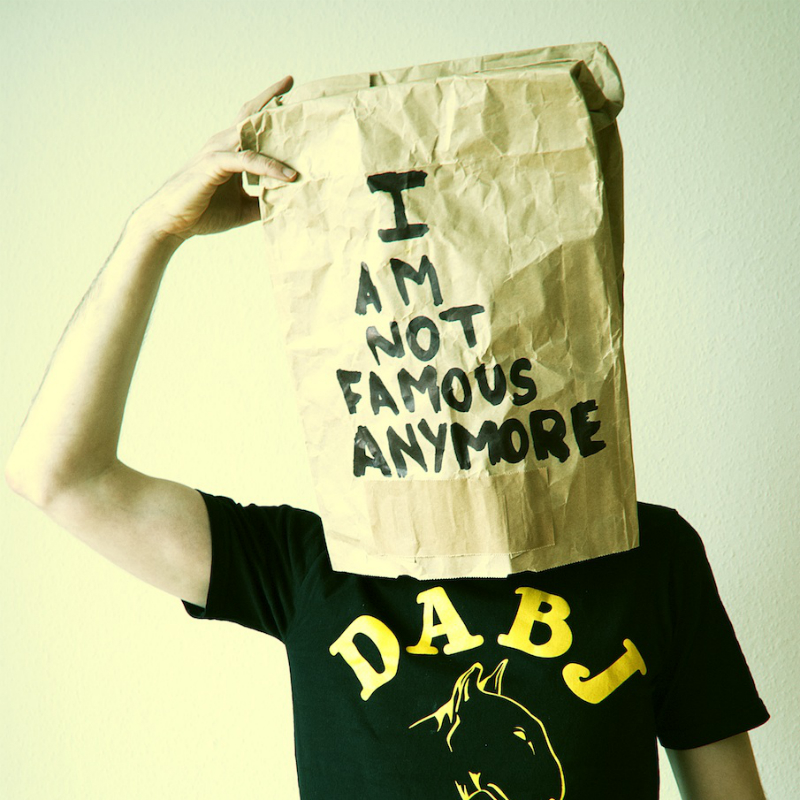 Do you ever feel a disconnect between that and being in the more regimented music industry? Do you mind doing promo and suchlike?
Do you ever feel a disconnect between that and being in the more regimented music industry? Do you mind doing promo and suchlike?
It is what it is, really. I used to hate it, but I have come to realise that it’s a necessary part of the process. It’s very disconnected from the scene where I come from, which was obviously so dubious of the press after having so many “new age travellers ate my dog” or “Started a riot” kind of crap in the newspapers back in the day. But you can’t expect people to notice your music when there isn’t a narrative or personality to go with it.
For many years, I was on this old school vibe of “let the music do the talking,” but I came to find that you come to a point where that doesn’t work any more – you can only go so far with that. It did work quite well at the beginning of releasing as Marquis Hawkes, and a lot of people assumed that it was an intentional marketing move, but it just started as one of those things to disconnect myself from stuff I’d done before. Then it just became funny to us in a way, to see how hysterical people would get about stuff because you would keep everything from them, you would be one of the few people that wasn’t spamming everyone with your interview or press you were getting, and then they would start making up their own ideas of who I was, that I was from Glasgow, or was from Chicago, or was intentionally pretending to be from Chicago, when really we were just laughing our arses off at the stupidity of some of the shit we were reading.
We were just laughing our arses off at the stupidity of some of the shit we were readingBut ultimately It’s all well and good being like that – anti-press etc – when you are doing an underground project, and you’re happy being underground, but it came to a point, particularly in regard to promoting this album, where it was like “OK, I’ve got people investing quite a bit of time and money in me, and really I owe it to them to do what I need to do to sell this record, to make people aware of what I’m doing.” So I did a full U-turn on the “no photos, no interviews” thing.
Certain elements of the online music media’s collusion with a lot of the bullshit I had to deal with over the years, which was quite damaging psychologically for me, had made me very wary of talking to anyone. But then I came to the point where I felt the time was right to tell my story, and join up the dots of where I come from, more than anything to put to bed stupid speculation made up by people who didn’t really know anything about me. And it feels like a weight off my shoulders now.
And the promo can be fun. Did you see the photos of the billboard on Facebook? Basically, the guys at Houndstooth, they paid for a billboard, just one billboard in East London on Commercial Road, they didn’t specify where it was going to exactly be, but it turned out that this huge poster – “The new album Marquis Hawkes – Social Housing” – they’d put it up on this new development that says, "Luxury apartments, prices starting from £354,000". But then, even better, someone else has graffed [graffiti-ed] up, there’s a picture of the skyline of a potential view out of the apartments, and someone’s written, “This is all lies” and written a whole load of stuff about, you know, we need social housing in London, and bang next to it is my poster [laughs]. It was just an absolutely amazing coincidence that… I was amazed to get a billboard in London anyway, pretty amazing because he’d managed to get a good deal on it, but yeah, how apt is that?
- Social Housing is out now on Houndstooth.
- Parts of this interview appeared in a feature in the August 2016 issue of Mixmag.
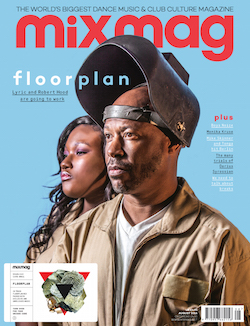

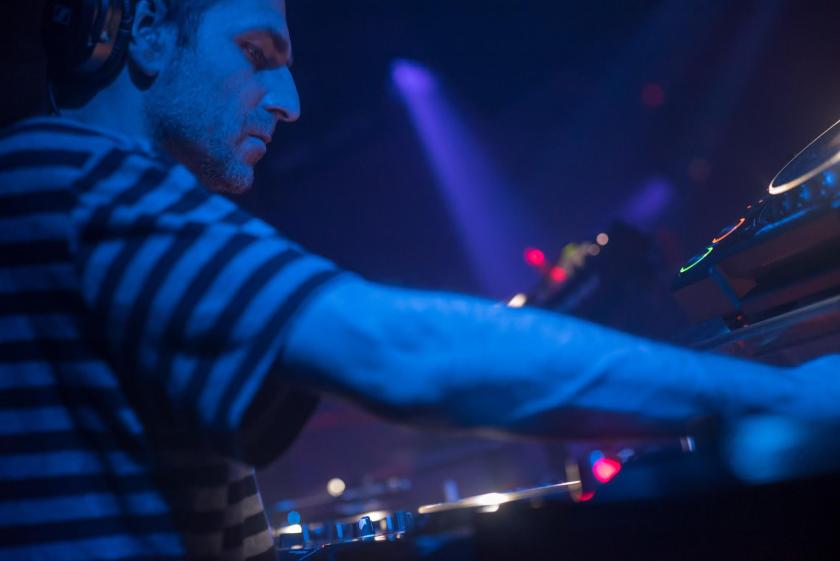








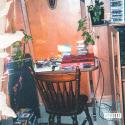




Add comment